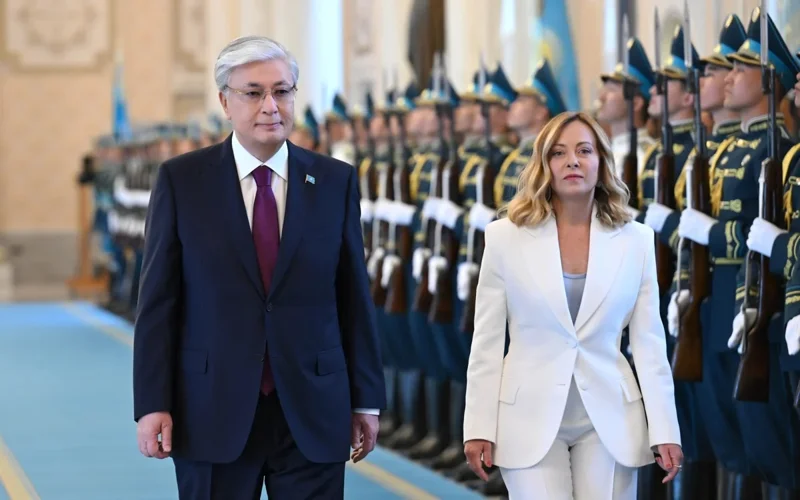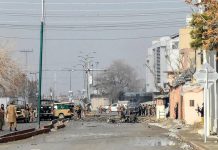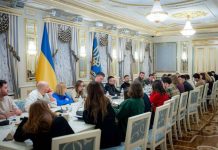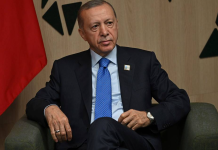ASTANA – The visit of Italian Prime Minister Giorgia Meloni to Kazakhstan marked a qualitatively new stage in the development of bilateral relations between Astana and Rome. An analytical review by a Kazinform News Agency correspondent explores the outcomes of the visit and the prospects for Kazakh-Italian friendship.
Regional and international context
The official visit of Giorgia Meloni to Kazakhstan, along with her participation in the first “Central Asia + Italy” summit and the Astana International Forum, marked a significant milestone in developing both bilateral relations and regional cooperation with the EU.
The Italian Prime Minister was received in the finest traditions of Kazakh hospitality. Kassym-Jomart Tokayev personally met her at the aircraft stairs with a bouquet of pink peonies, while the traditional Kazakh chapan particularly suited the Italian guest.
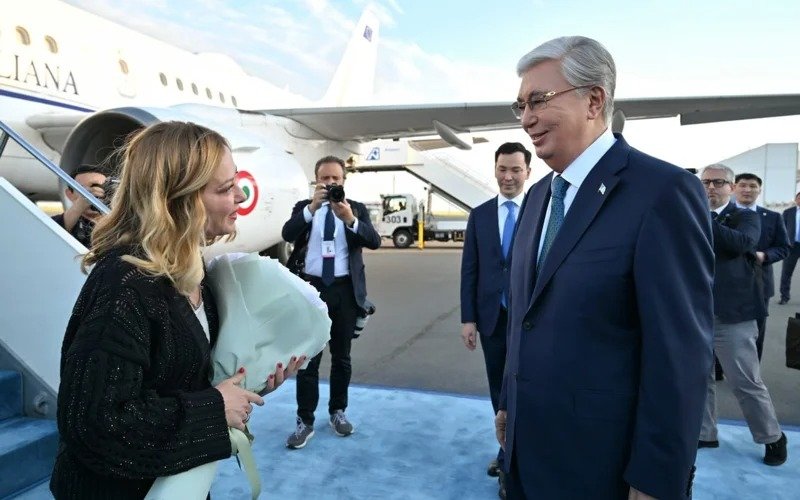
The informational backdrop of the negotiations was mutually complimentary. Italy’s Premier called the Kazakh President “one of the most pragmatic leaders” she had encountered. Indeed, pragmatism defined the tone of the meetings – the dialogue platforms featured concrete, constructive proposals to intensify bilateral and multilateral cooperation.

Following the meeting, several documents were signed, including a Joint Statement on Strengthening Strategic Partnership and an Agreement on Cooperation in Critical Minerals and Raw Materials.
Particular attention was drawn to the memorandum between Samruk-Kazyna Fund and Italian industrial giant Maire Tecnimont regarding gas separation plant and petrochemical facility projects in Atyrau region.
Bernini emphasized his company’s readiness to work with Kazakhstan’s human resources and production base, adapting projects to the country’s technological sovereignty strategy. This approach aligns with Astana’s priority – transitioning from raw material exports to industrialization and high value-added product supplies.
The Italy-Kazakhstan Business Forum made a significant contribution to economic cooperation development. Contracts worth €180 million were signed, covering mechanical engineering, agro-processing, metallurgy, petrochemicals, and logistics digitalization.
Italy ranks among the top 10 largest investors in Kazakhstan’s economy. Production localization projects and technology transfer are becoming the new norm in cooperation. Beyond the oil and gas sector, Italian companies are represented across many spheres.
Agro-industrial cooperation is also in focus. Kazakhstan expressed readiness to increase exports of organic grain, oilseeds, and feed, proposing to establish joint processing and packaging lines for agricultural products under a unified brand for international markets.
“Central Asia + Italy”: a gateway to regional integration
The “C5+Italy” summit became the key event of Italian Prime Minister Giorgia Meloni’s visit to Kazakhstan, confirming Rome’s interest in sustainable cooperation with all countries in the region.
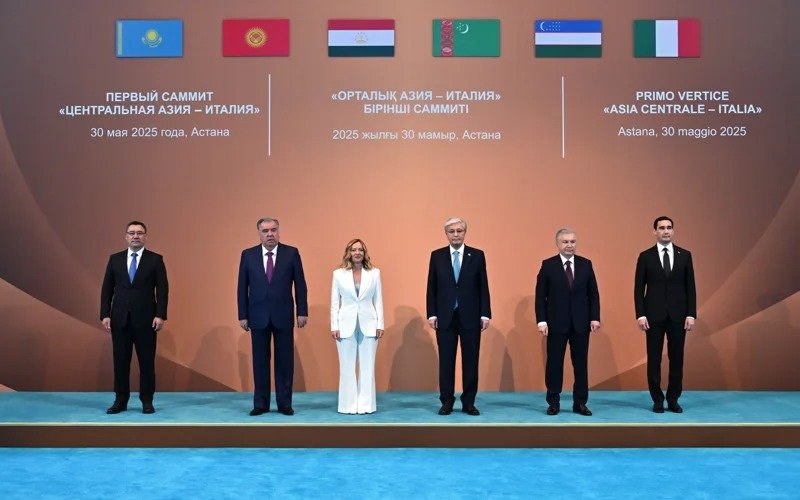
Kazakhstan, as Central Asia’s largest economy and logistics hub, served as meeting coordinator, providing a platform for systematic negotiations and signing key agreements. Italy, acting as a “bridge” between the EU and Central Asia, promotes sustainable infrastructure, the “green” agenda, and cultural-humanitarian cooperation, including education and tourism.
The opening of trade houses and logistics centers could provide serious impetus to trade expansion. Opening an Italian Trade House in Almaty was proposed. Another initiative announced was the creation of a Regional Research Center to gather and analyze up-to-date information on rare earth metal deposits in Central Asia. The energy sector traditionally serves as the main driver of cooperation. Experts highly value Italy’s role in global supply chains for Kazakh hydrocarbons to international markets.
But logistics is only part of the picture. Italian company Eni is one of the key investors in the Karachaganak oil and gas field, which produces over 20 billion cubic meters of gas annually and 11 million tons of gas condensate. This is especially important under conditions of global transition to low-carbon energy, when natural gas becomes transitional fuel.
Theoretically, the field with current gas reserves could ensure production up to 100 billion cubic meters annually. This could involve liquefied gas supplies and logistics development using ecological fuel, especially in the European direction.
This cooperation could become not only an economic but also technological breakthrough, since Italian business knows the Kazakh market well, trusts the country, and continues to be an important partner on the path to an energy future.
Points of attraction
The President identified strengthening transcontinental connectivity as another pressing task. In his view, by developing the Trans-Caspian International Transport Route, countries are essentially reviving the ancient Silk Road on a new foundation.
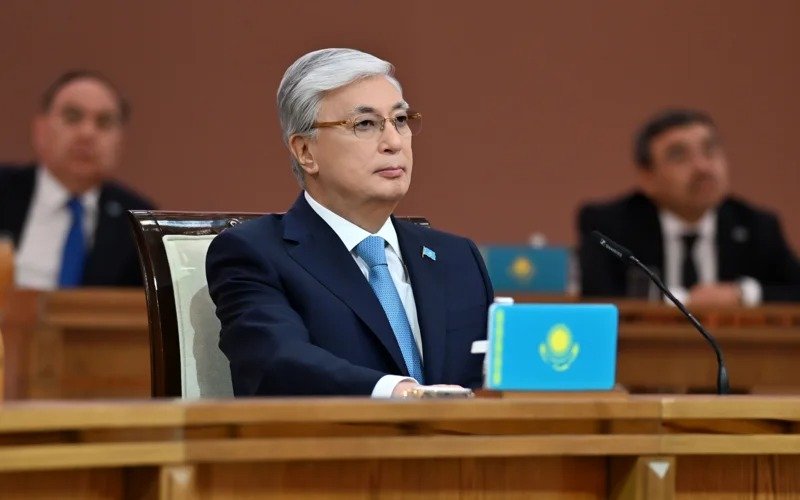
Giorgia Meloni considers the Middle Corridor one of the most promising directions for CA-Italy cooperation in developing digital and physical infrastructure.
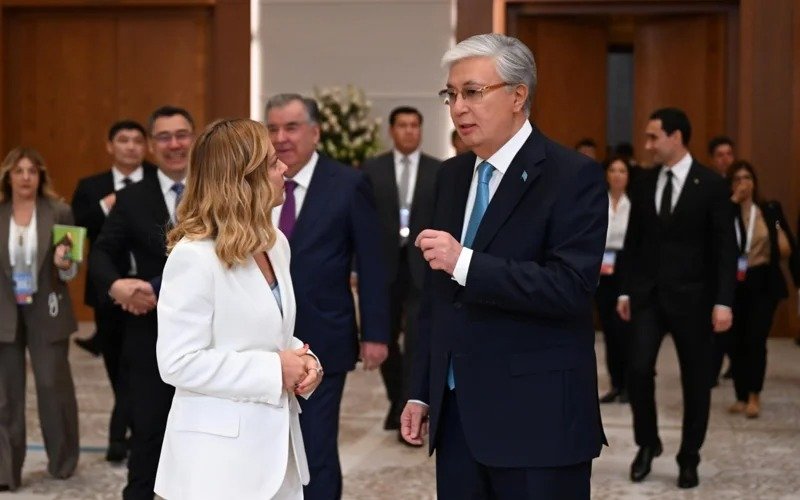
Majilis deputy Aidos Sarym commented to Kazinform News Agency that Kazakhstan’s development of new routes and search for new formats is both natural and highly promising.
Educational and cultural cooperation has become another point of attraction. Currently, approximately four thousand Kazakhstani students study in Italy.
In this context, Italy offers technological solutions and expertise in energy, chemistry, water resources, fintech, and supply chain management. Companies like Maire Tecnimont have already begun cooperation with Kazakh universities, opening opportunities for personnel development and technological self-sufficiency.
Visit outcomes
Astana and Rome possess a solid foundation for expanding cooperation in energy, industry, logistics, and sustainable development. Significant prospects emerge in innovation, technology exchange, and new forms of interaction in a rapidly changing world.
For Kazakhstan, this represents an opportunity to accelerate industrialization, strengthen integration into global supply chains, and enhance investment attractiveness. For Italy, it’s a chance to consolidate positions in Central Asia, gain access to resources and markets, and demonstrate to the EU the effectiveness of its own foreign economic strategy.
BY: The Times Union



